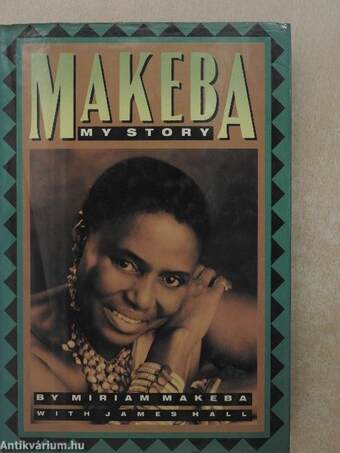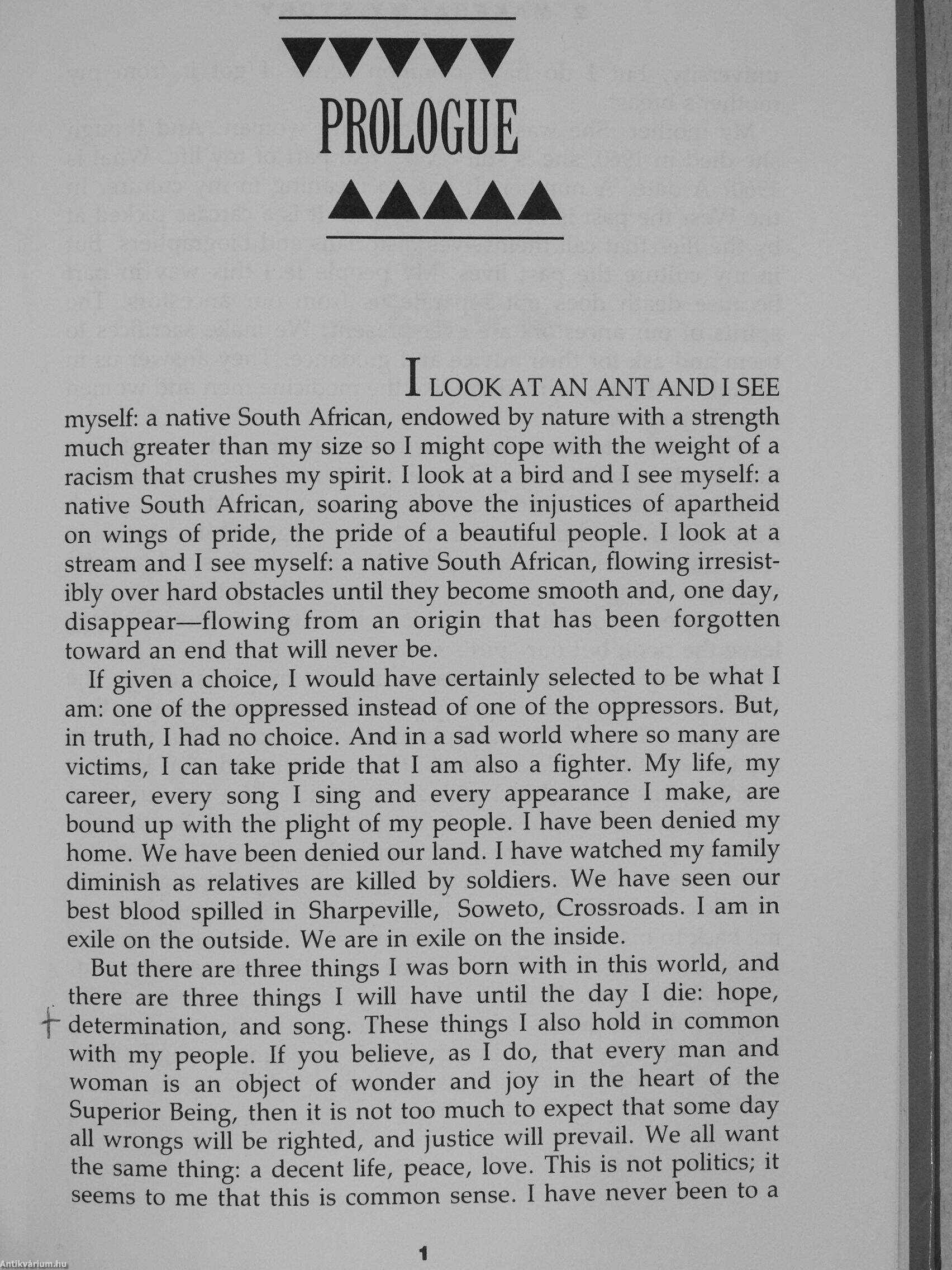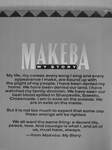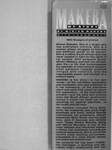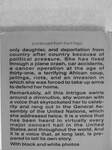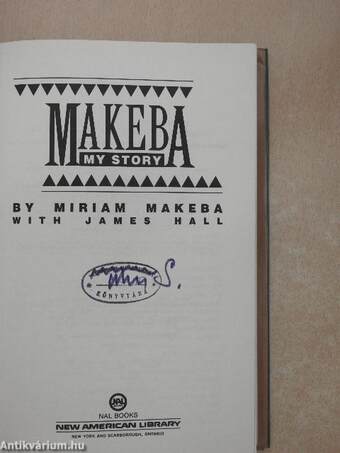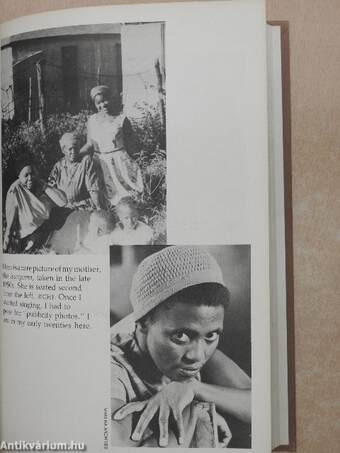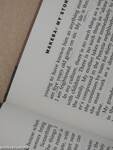1.066.799
kiadvánnyal nyújtjuk Magyarország legnagyobb antikvár könyv-kínálatát

VISSZA
A TETEJÉRE
JAVASLATOKÉszre-
vételek
Makeba - My Story
| Kiadó: | New American Library |
|---|---|
| Kiadás helye: | New York |
| Kiadás éve: | |
| Kötés típusa: | Félvászon |
| Oldalszám: | 249 oldal |
| Sorozatcím: | NAL Books |
| Kötetszám: | |
| Nyelv: | Angol |
| Méret: | 23 cm x 16 cm |
| ISBN: | |
| Megjegyzés: | Fekete-fehér fotókat tartalmaz. |
naponta értesítjük a beérkező friss
kiadványokról
naponta értesítjük a beérkező friss
kiadványokról
Előszó
TovábbFülszöveg
My life, my career, every song I sing and every
appearance I make, are bound up with the plight of my people. I have been denied my
home. We have been denied our land. I have watched my family diminish. We have seen our best blood spilled in Sharpsville, Soweto, Crossroads. I am in exile on the outside. We are in exile on the inside.
But it is not too much to expect that some day these wrongs will be righted.
We all want the same thing: a decent life, peace, love. And courage is what I, and all of us, must have, always.
—from Makeba: My Story
With 16 pages of photos
Miriam Makeba. She is a singer who has enthralled millions. She is a woman whose struggles to find love and selfhood speak to all women. She is a native South African who has never ceased to fight for the rights of her people. With poignant grace, Miriam Makeba portrays her remarkable life—a life that encompasses the splendor of international acclaim, bitter personal tragedy, political intrigue and violence,... Tovább
Fülszöveg
My life, my career, every song I sing and every
appearance I make, are bound up with the plight of my people. I have been denied my
home. We have been denied our land. I have watched my family diminish. We have seen our best blood spilled in Sharpsville, Soweto, Crossroads. I am in exile on the outside. We are in exile on the inside.
But it is not too much to expect that some day these wrongs will be righted.
We all want the same thing: a decent life, peace, love. And courage is what I, and all of us, must have, always.
—from Makeba: My Story
With 16 pages of photos
Miriam Makeba. She is a singer who has enthralled millions. She is a woman whose struggles to find love and selfhood speak to all women. She is a native South African who has never ceased to fight for the rights of her people. With poignant grace, Miriam Makeba portrays her remarkable life—a life that encompasses the splendor of international acclaim, bitter personal tragedy, political intrigue and violence, and the irrepressible power and triumph of a brilliant talent.
MAKEBA is her story—in her own words—of the relentless oppression and humiliation she was subjected to in her homeland of the enormous talent and spirit that raised her above this oppression of the international acclaim—and the exile she endured when the South African government feared it could not keep her from speaking out against apartheid of her music and her men. Her mentors included Harry Bela-fonte; her husbands, jazz great Hugh Masekela and black radical Stokely Carmichael; her protectors, African statesman Seku Tour6; and her loyal fans, John F. Kennedy and millions more. Today, Miriam Makeba, along with Winnie Mandela, is one of the most beloved and influential women In Africa. Her worldwide concerts are political statements. She is one of the world's most exciting performers, possessed of a voice whose beauty and power are without rival. Her personal life has been volatile: five marriages, a touching and ultimately tragic relationship with her
(continued from front flap)
only daughter, and deportation from country after country because of political pressure. She has lived through a plane crash, car accidents, a cancer operation at the age of thirty-one, a terrifying African coup, jailings, riots, and an invasion in which she was forced to take up arms to defend her home. Remarkably, all this intrigue swirls around a diminutive, shy woman with a voice that skyrocketed her to celebrity and rang out in the General Assembly of the United Nations, which she addressed twice. It is a voice that has been heard in virtually every major concert hall in the United States and throughout the world. And it is a voice that, at long last, is prepared to tell its own story. With black and white photos Vissza
Témakörök
- Idegennyelv > Idegennyelvű könyvek > Angol > Művészetek > Zene
- Idegennyelv > Idegennyelvű könyvek > Angol > Szépirodalom > Megtörtént bűnügyek, dokumentumregények
- Idegennyelv > Idegennyelvű könyvek > Angol > Szépirodalom > Regény, novella, elbeszélés
- Szépirodalom > Regény, novella, elbeszélés > Az író származása szerint > Afrika > Dél-afrikai Köztársaság
- Szépirodalom > Regény, novella, elbeszélés > Tartalom szerint > Művészetek > Zene
- Művészetek > Zene > Könnyűzene > Stílusok > Pop, rock
- Művészetek > Zene > Könnyűzene > Stílusok > Egyéb
- Művészetek > Zene > Könnyűzene > Zenei élet > Interjúk, művészportrék
- Szépirodalom > Regény, novella, elbeszélés > Tartalom szerint > Életrajzi regények > Önéletrajzok, naplók, memoárok
- Szépirodalom > Regény, novella, elbeszélés > Tartalom szerint > Kor- és társadalomrajz
- Szépirodalom > Megtörtént bűnügyek, dokumentumregények



